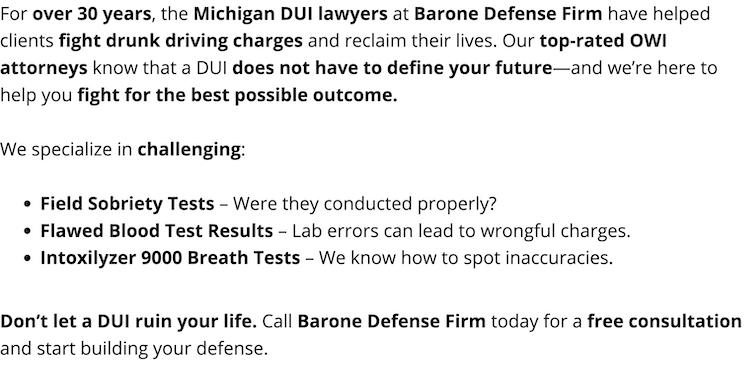DUI Bond Conditions
Pretrial release is synonymous with the term bond. The idea behind bond or pretrial release is that, instead of being stuck being bars until the individual can have a trial, they should be allowed to be released if they pay a certain amount of money and/or abide by certain conditions while released.
In first-offense drunk driving cases, most counties across the state of Michigan require typically between $100 and $500 cash paid to be released from jail.
Sometimes interim bond conditions may also be imposed at the time of release from jail. However, bond conditions may not be imposed until there is an "arraignment" or a formal reading of the charges against the client in court.
The pretrial release or bond conditions often include things like having to do breath testing or urine testing to show that the individual is not consuming any alcohol or illegal drugs while on bond. It can also prevent them from leaving the state of Michigan without the prior approval of the court. Some other conditions may be added in certain cases.
Determining Bond Amount
There is a Michigan court rule (MCR 6.106) that addresses the factors to be considered when setting the bond amount and the bond conditions. There are a number of factors that the court is supposed to review. Generally, some of the biggest concerns of the court are the seriousness of the offense, prior criminal history, the risk of flight (the risk that the person may not return to court for future court appearances), and the risk to the public.
In a drunk driving case, the risk to the public is that, if the person is released while awaiting trial, they may drink and drive again, endangering lives. By including a bond condition that prohibits any alcohol consumption and/or requires alcohol testing, the court can address that concern and prevent any future drunk driving while the case is pending.
Posting Bond
A bond can be posted by the person who has been arrested or by a third party. Michigan law actually prohibits attorneys from being able to post a bond, but the bond is typically posted at the jail before being released following the arrest. Sometimes, if the bond is being set at an arraignment, then you could pay the bond at the courthouse.
If an individual is facing a felony charge with a very high bond, them and their family may not have access to enough money to pay the high bond frequently set in those cases. They might need to request a bail bondsman.
A bail bondsman is a person who charges a much smaller amount of money than the amount being demanded by the court. The bail bondsman would try to track someone down if that person failed to appear in court. It is important to know that money paid to a bail bondsman will not be applied to the fines and costs at the end of the case if there is any kind of conviction and will not be returned if there is an acquittal or dismissal of the case.
In a 10% bond, 90% of the total bond paid would be able to be applied to any fines and costs at the end of the case, and 100% of a cash bond can be applied to fines and costs.
Documents Received in Jail
In Michigan, the documents most frequently received when someone is released from jail include a citation, an OD-80 subject test printout from the DataMaster DMT, and a Michigan Temporary Driving Permit. The OD-80 is printed by the DataMaster DMT and shows the alleged breath alcohol level.
The citation or ticket has the Operating While Intoxicated charge on it as well as any other misdemeanors and/or civil infractions that are being charged at the same time. If someone is charged with an OWI-3rd or any other felony, a citation is typically not issued. Instead, a complaint would be issued at a later date.
Since a Michigan driver's license is confiscated and destroyed by the officer at the time of the arrest, the temporary driving permit becomes the driver's license until after the case is resolved and after any period of license sanction following a conviction. It is important for this permit to be carried with the driver whenever he or she is driving any vehicle.
The Michigan temporary driving permit has two forms, the DI-177 and the DI-93. The DI-177 is issued in cases in which someone complies with whichever evidential test was offered by the officer—bretah or blood.
In cases in which someone refuses a breath or blood test and the officer requests a search warrant for a blood test, the version of the temporary driving permit is the DI-93. In cases in which a DI-93 is issued, there should also be a second sheet that goes along with the temporary driving permit, the Request for Hearing. It is very important that anyone who receives one of those submits that request for hearing within 14 days because, if it is not received within 14 days, there will be an automatic suspension of all driving privileges.
Another document they someone might receive in some locations is called an interim bond. n interim bond includes some bond conditions that are set before the arraignment in court. It is important to take a careful look at those interim bond conditions because those conditions sometimes do not allow a person to leave the state of Michigan. This can be a serious concern for someone who lives and/or works outside of the state of Michigan.
 Barone Defense Firm Home
Barone Defense Firm Home




















